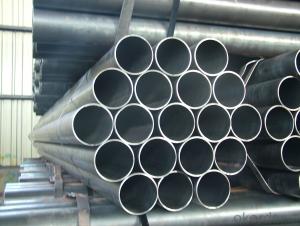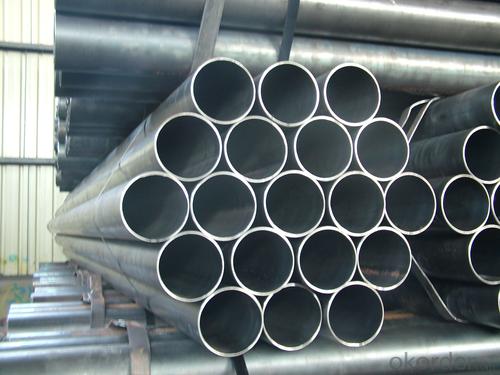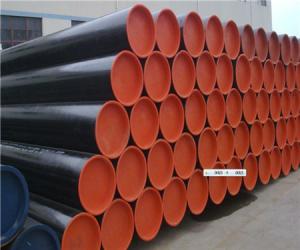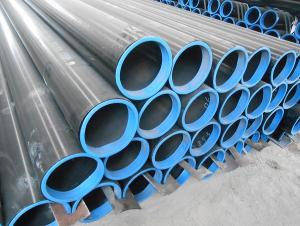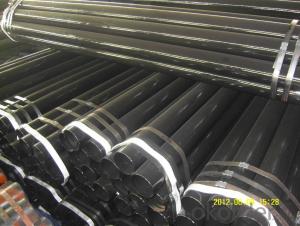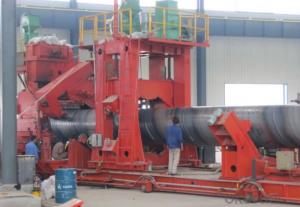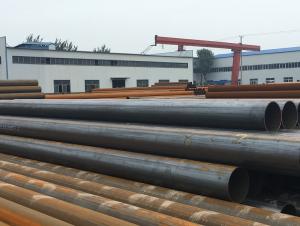Roller pipes
- Loading Port:
- China Main Port
- Payment Terms:
- TT OR LC
- Min Order Qty:
- -
- Supply Capability:
- -
OKorder Service Pledge
OKorder Financial Service
You Might Also Like
Outside diameter | 1/2”-12” |
Wall Thickness | 1.0 -12mm SCH40,60,80, etc. |
Tolerance | ±5% |
Material | Q195,Q215,Q235,Q345 |
Quality grade | First grade |
Section Shape | Round |
Surface Treatment | Hot rolled and ERW |
Technique | Hot rolled |
Ends | Threaded Ends, Grooved Ends |
Length | Less than 12m |
MOQ | 10 Metric Ton or as your request if normal size |
Deliver Time | Stock |
Package | Nude pipe in bundle or as your request |
Payment terms | T/T,L/C |
Standard | GB/T3091-2008; BS1837-1985; ASTM A53/A53M-07; ASTM A513-07; ASTM A252; JIS G3444-06; JIS G3452-2010; EN10255; DIN2440 |
Main Usage Relevant Size | 1. Water Pipe Material: Q195/Q215/Q235/Q345B Outside Diameter: 60-273mm 2. Threaded/Screwed Pipe Material: Q195/Q215/Q235/Q345B Outside Diameter: 21.3-165.1mm 3. Structural Steel Pipe Material: Q195/Q215/Q235/Q345B Outside Diameter: 21.7-190.7mm 4. Scaffolding Pipe Material: Q195/Q215/Q235/Q345B Outside Diameter: 48mm 5. Straight Seam Welded Pipe Material: Q195/Q215/Q235/Q345B Outside Diameter: 48-273mm 6. Steel pipes with a longitudinal ERW Material: Q195/Q215/Q235/Q345B Outside Diameter: 21.3-273.1mm Standard: GB/T 3091-2008 |
- Q: How to descaling galvanized steel pipe?
- Is red rust or white rust, red rust is the base material rust, white rust is Zinc Coating Rust
- Q: What is the shear strength of steel pipes?
- The shear strength of steel pipes can vary depending on various factors such as the grade of steel, size and thickness of the pipe, and any additional treatments or coatings applied. Generally, the shear strength of steel pipes is high due to the inherent strength of steel, making them suitable for various structural and industrial applications.
- Q: Are steel pipes suitable for potable water supply?
- Yes, steel pipes are suitable for potable water supply. They are commonly used for water distribution systems due to their durability, strength, and resistance to corrosion. However, it is important to ensure that the steel pipes are properly coated or lined to prevent any potential contamination of the water supply.
- Q: How are steel pipes connected to other plumbing components?
- Steel pipes are commonly connected to other plumbing components through various methods, depending on the specific application and requirements. The most common methods of connecting steel pipes to other plumbing components include threading, welding, and using mechanical fittings. Threading is a process where the ends of the steel pipes are cut and grooves are created on the outer surface to form a threaded connection. This allows the pipes to be screwed into fittings such as elbows, tees, or couplings. Threaded connections are often used in smaller diameter pipes and low-pressure applications. Welding is another commonly used method to connect steel pipes. It involves heating the ends of the pipes and joining them together by melting the metal at the point of contact. This creates a strong and permanent connection. Welded connections are often used in larger diameter pipes and high-pressure applications. Mechanical fittings are another popular option for connecting steel pipes. These fittings are designed to be easily installed without the need for welding or threading. They typically consist of two parts – a compression ring and a nut. The compression ring is placed over the pipe, and the nut is tightened, compressing the ring onto the pipe and creating a secure connection. Mechanical fittings are commonly used in both residential and commercial plumbing systems. In addition to these methods, other connection techniques such as flanges, grooved couplings, and soldering can also be used to connect steel pipes to other plumbing components, depending on the specific needs of the system. Overall, the method used to connect steel pipes to other plumbing components depends on factors such as the size of the pipes, the pressure of the system, the type of fluid being transported, and the specific requirements of the project. It is important to choose the appropriate method and ensure that the connections are properly installed to ensure the integrity and efficiency of the plumbing system.
- Q: What is the electrical conductivity of steel pipes?
- Steel pipes have a high electrical conductivity due to the metallic nature of steel. The electrical conductivity of steel pipes can vary depending on the specific composition and properties of the steel used. Generally, steel has a conductivity ranging from 6.99 × 10^6 to 9.64 × 10^6 siemens per meter (S/m) at room temperature. This conductivity allows steel pipes to efficiently conduct electricity and be used in various applications such as electrical transmission and grounding systems.
- Q: Can steel pipes be used for wastewater treatment systems?
- Yes, steel pipes can be used for wastewater treatment systems. Steel pipes are commonly used in wastewater treatment systems due to their durability, corrosion resistance, and ability to withstand high pressures and temperatures. Additionally, steel pipes can be easily welded and have a long lifespan, making them a suitable choice for transporting and distributing wastewater within treatment facilities.
- Q: What are the safety measures to consider when working with steel pipes?
- When working with steel pipes, it is important to consider several safety measures. Firstly, wearing appropriate personal protective equipment (PPE) such as gloves, safety glasses, and steel-toed boots is crucial to protect against potential injuries. Secondly, ensuring proper ventilation in the work area is important to avoid inhalation of harmful gases or fumes. Additionally, practicing proper lifting techniques and using mechanical aids when handling heavy pipes can prevent strains or back injuries. It is also essential to be cautious of sharp edges or protruding objects on the pipes and to secure them properly to prevent accidents. Lastly, following established safety protocols, such as conducting regular inspections and adhering to lockout/tagout procedures, helps minimize the risk of accidents or equipment malfunctions.
- Q: What is a flange and how is it used in steel pipes?
- A flange is a mechanical device that is used to connect two sections of steel pipes together. It consists of a flat or raised ring that is attached to the end of each pipe section. The flange provides a surface for the pipes to be bolted or welded together, creating a secure and leak-proof joint. It also allows for easy disassembly and reassembly of the pipes when necessary. Flanges are commonly used in various industries, such as oil and gas, water treatment, and manufacturing, where the connection between steel pipes needs to be strong and reliable.
- Q: Can steel pipes be used for LNG terminals?
- Yes, steel pipes can be used for LNG terminals. Steel pipes are commonly used in the construction of LNG terminals due to their durability, strength, and resistance to extreme temperatures. Additionally, steel pipes can effectively handle the high-pressure requirements of LNG transportation and storage.
- Q: How are steel pipes used in sewage systems?
- Steel pipes are commonly used in sewage systems for their strength, durability, and resistance to corrosion. These pipes are used to transport sewage and wastewater from homes, businesses, and industrial facilities to treatment plants or disposal sites. They are ideal for underground installations due to their ability to withstand high pressure and the weight of the surrounding soil. Additionally, steel pipes can be welded together, providing a seamless and leak-proof system that ensures the safe and efficient transportation of sewage.
Send your message to us
Roller pipes
- Loading Port:
- China Main Port
- Payment Terms:
- TT OR LC
- Min Order Qty:
- -
- Supply Capability:
- -
OKorder Service Pledge
OKorder Financial Service
Similar products
Hot products
Hot Searches
Related keywords
